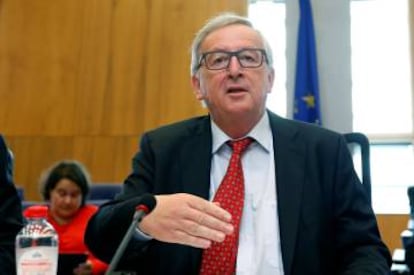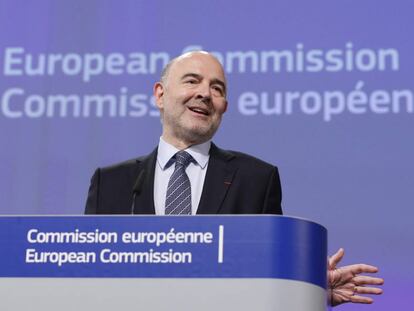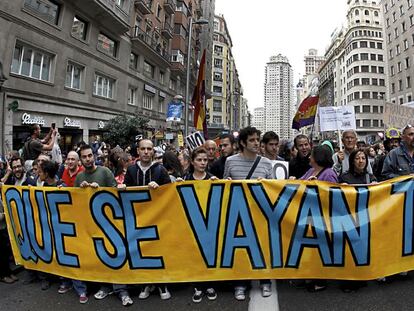The inside story of how Spain avoided EU sanctions
A late change in attitude by the German finance minister was key in preventing a fine for overshooting budget deficit targets


Greg Makiw, who teaches at Harvard, likes to say that “in economics, anything written 20 years ago is irrelevant.” And European fiscal regulations are precisely at that complicated age.
These days, nobody can remember why in in the world Europe decided, back in the forgettable 1990s, that a deficit of over 3% of GDP was equivalent to descending to Dante’s ninth circle of hell. Those rules were designed for a world that no longer exists.
As for the Stability Pact, only two quotes will remain carved in stone. One is Romano Prodi’s assessment, made a decade ago: “It’s stupid.” This view is now shared by many European commissioners, albeit in a low voice and only when there are no microphones in sight. The second relevant thing that’s been said about the Stability Pact by a high-placed EU official – off the record, inevitably – is the following: “Sanctions are like an atomic bomb: a deterrence weapon that is more effective when it is not used.”
Sanctions are not paid by politicians: they fall on the shoulders of the people. The Portuguese and the Spaniards have already made many sacrifices, and they would not understand such a decision
Greek Commissioner Dimitris Avramopoulos
The decision whether or not to press that nuclear button was made at a three-hour meeting on Wednesday. But the ball really got rolling last weekend at the G-20 summit in China, where German finance minister Wolfgang Schäuble phoned his country’s commissioner in Europe, Günther Oettinger, and told him to soften his position on the issue of sanctions against Spain and Portugal.
After meeting with his counterparts from Spain, France and Italy, Schäuble defined Germany’s new position: in a post-Brexit Europe, the time had come (temporarily, to be sure) to use the carrot rather than the stick. Especially if Italy was going to be allowed to blatantly ignore EU rules about state aid in order to shore up its own ailing banking sector.
On Tuesday, Schäuble kept making more phone calls. He got in touch with most commissioners of the European People’s Party (and there are 14 of them, no less) and even rang up Commission President Jean-Claude Juncker.
Sign up for our newsletter
EL PAÍS English Edition has launched a weekly newsletter. Sign up today to receive a selection of our best stories in your inbox every Saturday morning. For full details about how to subscribe, click
According to EU sources, the German minister’s message was something like “the sanctions won’t be necessary; for Germany, it is enough with Ecofin’s decision that Spain and Portugal did not take effective measures and that they will remain under strict oversight.”
Juncker then met with the “two tenors” of fiscal regulations: Commission Vice-President Valdis Dombrovskis, a Latvian conservative and a firm defender of sanctions, and Finance Commissioner Pierre Moscovici, a French Socialist, who won this game hands down (and avoided setting a precedent for his own country while at it).
The Spaniard Miguel Arias Cañete, who is the energy commissioner, and Portugal’s Carlos Moedas, who heads the science and research department, had been trying to pave the way for such a decision for days. But it was the sheer power of Schäuble’s telephone calls that finally lowered the shields of most hardliners.
Juncker’s strategy
At the Wednesday meeting, Juncker allowed those in favor of cancelling the sanctions to speak first. Only when it became apparent that they were winning the game did he let the pro-punishment camp speak its mind. There were only four of them: Dombrovskis, Jobs Commissioner Jyrki Katainen, Trade Commissioner Cecilia Mälmstrom and Digital Economy Commissioner Günther Oettinger. The outcome: 23 to 4 against fines.
Even so, there was a tough debate and the pro-sanction side fought to the end. “If we don’t do it today, there will never be sanctions,” said Katainen. “The most appropriate thing is a symbolic sanction,” defended Dombrovskis.
But the reply was overwhelming: no sanctions, not even symbolic ones, said Dutch Vice-President Frans Timmermans. His view was backed by the socialist commissioners, by the liberal commissioners and by a large majority of the conservative commissioners.

Greek commissioner Dimitris Avramopoulos, who is responsible for migration affairs, noted how inopportune sanctions would be at this time: “Sanctions are not paid by politicians: they fall on the shoulders of the people. The Portuguese and the Spaniards have already made many sacrifices, and they would not understand such a decision.”
Juncker closed the meeting with some thoughts of his own: “The past is past, and a sanction will not change that: the threat of freezing funds and the new deficit targets, combined with strict oversight, are the right strategy for both countries to get their accounts in order.”
While Brussels officials presented the decision to the press using technical and moral arguments, there was some ideology at play as well: sources consulted by this newspaper said that Schäuble’s telephone calls represent a calculated political move. Schäuble and Juncker want to help one of their own remain in power. Spain has been an ally of Germany these last few years, and the votes of the Spanish Popular Party were instrumental in getting Juncker into the European Commission.
After losing a seat on the European Central Bank and on the Eurogroup, and after sustaining exemplary punishment following the banking bailout, it was time to reward acting prime minister Mariano Rajoy’s loyalty towards Berlin, said these sources.
Hegel once said that the excessive intensification of one’s own principles is the leading cause of a civilization’s downfall. Recently, the mantra in Brussels’ hallways of power had been that “rules are rules,” a justification of a series of disastrous decisions made throughout the euro crisis.
And despite the decision to let Spain and Portugal off the hook, Juncker and his people made efforts on Wednesday to try to show that they have not veered away from the sacrosanct rules.
Yet the mantra in Brussels has rapidly shifted: “The Stability Pact is dead and buried,” said one Eurogroup minister in the evening. May it rest in Hegelian peace.
English version by Susana Urra.









































